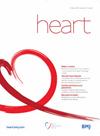Intensive care of adults with congenital heart disease
引用次数: 1
Abstract
Congenital heart diseases (CHD) are a variety of heart conditions that afflict an increasing number of adults. Significant advances in paediatric cardiology and paediatric cardiac surgery over the past decades have modified mortality trends and currently nearly 90% of children born with these defects reach adulthood. As a result, there are nowadays more adults than children living with CHD. However, these are repaired hearts with residual lesions that may require subsequent interventions over time and that are exposed to longterm complications, predominantly arrhythmias and heart failure. Moreover, the particular physiology of some CHD has a multisystemic impact that may lead to complications in organs far from the heart. Some of these cardiovascular and noncardiovascular complications are lifethreatening and require intensive care unit (ICU) admission. Such is the case of severe arrhythmias, acute pulmonary oedema, haemoptysis due to major aortopulmonary collateral arteries, acute cholecystitis due to gallstones in patients with cyanosis, infective endocarditis or stroke, among others. Approximately 16% of patients with adult congenital heart disease (ACHD) will require an ICU admission by the age of 40, particularly those with more complex forms of CHD. Management of these patients during this critical situation is challenging and requires a complete understanding of the anatomy, physiology and associated comorbidities to tailor an individualised approach that achieves the optimal care.成人先天性心脏病的重症监护
先天性心脏病(CHD)是一种折磨越来越多成年人的各种心脏病。过去几十年来,儿科心脏病学和儿科心脏外科的重大进展改变了死亡率趋势,目前近90%的出生时患有这些缺陷的儿童已成年。因此,如今患冠心病的成年人比儿童多。然而,这些是修复后的心脏,其残余病变可能需要随着时间的推移进行后续干预,并暴露于长期并发症,主要是心律失常和心力衰竭。此外,某些冠心病的特殊生理学具有多系统影响,可能导致远离心脏的器官出现并发症。其中一些心血管和非心血管并发症危及生命,需要入住重症监护室。这是严重心律失常、急性肺水肿、主要主动脉-肺侧支动脉引起的咯血、发绀患者因胆结石引起的急性胆囊炎、感染性心内膜炎或中风等情况。大约16%的成人先天性心脏病(ACHD)患者在40岁之前需要入住ICU,尤其是那些患有更复杂形式CHD的患者。在这种危急情况下对这些患者的管理具有挑战性,需要对解剖、生理学和相关合并症有全面的了解,以制定个性化的方法来实现最佳护理。
本文章由计算机程序翻译,如有差异,请以英文原文为准。
求助全文
约1分钟内获得全文
求助全文

 求助内容:
求助内容: 应助结果提醒方式:
应助结果提醒方式:


